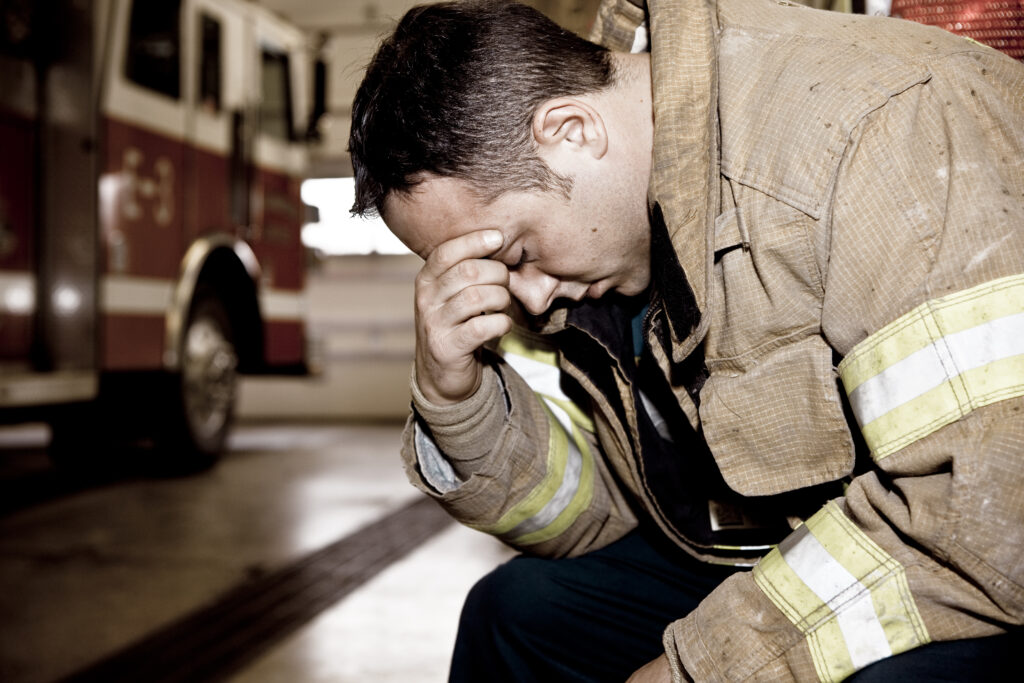Only Human
The thing that unites all first responders is that sense of responsibility, that need to help. But you can’t help everyone, and even for those you can, that help is limited. You’re only human, and you fall short. As a helper, you’re hard on yourself. Your standards are higher; your minimum efforts are much more.
Aside from work life, this standard of above-average human requirement goes into your personal life. You must provide and work and be (or appear) social and maintain a home and be fun to be around and have your life together and be totally fine and… and…
Fall Apart
Eventually, you fall apart. Whether in your marriage, at the job, with your kids, or friends and family, you can’t keep up with all the demands. It’s too heavy, too much. The pressure weighs on you, but most people get what pressure and stress feel like. What they don’t get is the daily trauma of first responder life.
Calls come home with you, bad calls, awful calls. Sounds, sights, smells. You shove it down, pressing it like a trash compactor. No one needs to know about that. You’ll take the scars, protecting others from the horrible things you’ve experienced. You’re fine… until you fall apart.
Fall Out
It was a fight; you lost your temper over something stupid. Actually, it happened over something stupid but really, all along, your temper was hanging by a thread. Every trauma, every stress, every idiotic call that followed a terrible call, every arrogant person ignorant of those in real distress… They all compounded into one massive explosion.
Maybe it wasn’t a fight. Maybe it was your mouth, on the job, to a patient. Or it was to your boss or your coworker, or your neighbor, or your kid’s teacher. It doesn’t matter. You lost it, and now you have to deal with it. One. More. Thing.
Recovery
Feels like you can’t recover. Feels like you screwed up worse than you can fix. It’s over, right?
Wrong.
First of all, if you’re breathing, you’re going to get better. Period. Keep breathing. Pause and do that as long as you need to. You’re not defined by your worst moments or traumas. You are valued and worth saving. The road starts with finding out how to forgive yourself. You need to move forward.
Second, who said you need to be the one to do the fixing. You don’t, at least not alone. You are not alone. Countless others who have suffered like you are here for you, on the other side of trauma, stress, depression, even suicide attempts. Saying your situation is worse is like saying theirs wasn’t hard enough. They did it; so can you.

How to Forgive Yourself
The road to recovery starts with a choice to value yourself. When you value yourself, you’re willing to forgive yourself. Forgiveness is itself a crucial step to feeling better. No grudge has ever helped a person move forward. Read that again. No grudge has ever helped a person move forward. So, why would you continually hold something against yourself? That choice to forgive yourself doesn’t need logic; it doesn’t need to make sense in the moment. You just need to want to be better. Here’s how.
- Realize you’re human. You are. You’re stuck with the same emotional capacity and physical limitations of the people you help. Doesn’t matter your size or resiliency level. We all fall into the same range of human ability physically, emotionally, and mentally.
- Recognize yourself as vulnerable. Listen, no matter how macho you want to appear to others, you’re still flesh and blood and neurons and such. You bleed, you break, you think, and you feel. You might manage better than a fair few. Good for you. Now manage this; you’re capable of breaking and that’s not a design flaw. In fact, it’s like that for a reason.
- Respect yourself. Imagine going up to a person in real need – not a whiny person but a legit person-in-need – and saying, “Fix it yourself.” Would you tell a worried parent to keep quiet when their child was in distress or missing or trapped? Of course not. Would you tell a wounded elderly person to limp themselves onto the gurney? Of course not. If you respect those in serious need, then respect yourself as well.
- Right your road. What do you do when someone’s in need? There’s training and protocols and people for all kinds of jobs. You assess the situation and discern the greatest need and how to meet that need in a capacity you can handle. If you can’t handle it, you call for backup. If a LEO comes upon an MVA, the scene can be secured while calling for help, but depending on the situation fire or EMS may be needed. That LEO can’t do it all. Neither can you.
- Rise to the occasion. Getting backup is a decision. It’s easy when it’s protocol and when it’s someone else’s emergency. No one wants it to be their emergency. This might be yours. Call for backup; it’s their job. Decide – decide – you don’t want to be like this anymore. Decide to let go of your shortcomings and be better.
A Better You
The real you is a better you. Hanging on to the version of yourself who lost control under duress, made poor choices, or was stuck in trauma will keep you in the past, in that dark, treacherous moment of despair. Don’t choose that. You are human and humans, as you know, fall short. That’s okay. Humans also have free will and we can choose to be better. You don’t have to do it alone.
You are worth fighting for. Would you let a fellow comrade, a brother or sister, fall and succumb to their injuries in the field? When you’re a first responder, you’re always in the field. Don’t assume we want to see you fall and succumb to your injuries. Decide to forgive yourself and move forward.
Resources
If you or someone you know is in need, please reach out and seek help. The following resources are available 24/7. Help can be quiet and discrete, but it doesn’t happen if you don’t reach out. If you’re not sure where to start or what you need, reach out to us at FRC here.
- Suicide & Crisis Lifeline – Dial 988 from inside the US or click to Live Chat.
- Veterans Crisis Line – Call 988 then press 1, or click to Live Chat, or Text 838255.
- Military OneSource – Live Chat or call 800-342-9647.
- Safe Call Now – staffed by first responders, for crisis, mental health issues, substance abuse, or personal issues, Call 206-459-3020
- Copline – 24-hour LEO peer support network, Call 800-267-5463
Others from NAMI:
- Next Rung – free peer support via talk, text, social media, email, Skype, or FaceTime. If you are in immediate need of help, text “SUPPORT” to 1-833-NXT-RUNG (698-7864)
- American Academy of Experts in Traumatic Stress - online support groups for emergency responders and health care workers
- Hope for Emergency Responders Organization (HERO) - warmline, peer support, and other resources for first responders, their families, and their friends
- Center for Firefighter Behavioral Health - resources and peer support for the occupational stress faced by firefighters
Others from Code Green:
- Fire/EMS Helpline – also called Share the Load, run by the National Volunteer Fire Council, help line and text line, provides a collection of good resources, call 888-731-3473
- Frontline Helpline – answered by first responders, call 866-676-7500
- Suicide.org – list of local helplines for all 50 states
